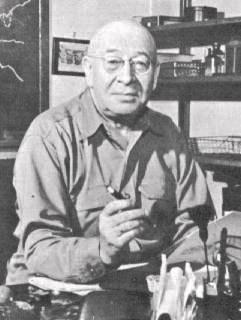
Born: July 3, 1879, Warsaw, Russian partition of Poland (presently Poland)
Died: March 1, 1950, Sharon, CT
The early days. Korzybski came from a wealthy, aristocratic Polish family which had worked as mathematicians, scientists, and engineers for generations. By his teenage years he could speak four languages -- Polish, Russian, French and German.
Higher education. He managed his father's estate before attending Warsaw Polytechnic Institute where he studied chemical engineering.
In the Russian Army.
At the outbreak of World War I in 1914 he volunteered to join the Second Russian Army, where he served as a battlefield intelligence officer. In December 1915 he was sent to Canada and the United States as an artillery expert for the Russian Army. Once in Canada he began studying English, which became his favorite language and the one in which he would write his major works.
In 1917 Korzybski moved to New York to supervise the shipping of ammunition to Russia. When the Russian Army and government collapsed later that year, he stayed in the United States to continue war efforts on behalf of the French and Polish armies.
Settling in the USA. Marriage.
Soon the United States Government hired him to travel the U.S. as a war lecturer to encourage sale of Liberty bonds.
Shortly after the Armistice, Korzybski met Mira Edgerly, an American of wide fame as a portrait painter on ivory. They were married two months later, in January 1919. Korzybski served, in 1920, with the Polish Commission to the League of Nations. His experiences during the war led Korzybski to contemplate the causes of the periodic bloodbaths that afflicted civilization. Eventually this led him to ponder the differences between humans and animals. He observed that animals by nature were mere hunters and gatherers or "space-binders" in their pursuit of food, whereas humans practiced agriculture, reflecting a human capacity to anticipate needs, learn from experiences and readily transmit these experiences as symbols to succeeding generations. He labeled this unique human behavior "time-binding" and noted that the rate of growth of human knowledge resembled a geometric (exponential) progression. Korzybski felt that teaching humans animalistic or mythological theories about themselves helped create and perpetuate such episodes as the recent war.
First book published. General Semantics.
After the publication of his first book, Manhood of Humanity in 1921 (the first printing of the book sold out in 6 weeks), he decided to remain in the United States and further develop his ideas. His work culminated in the founding of General Semantics, the basic ideas of which are outlined in Science and Sanity which was published in 1933. His book went through three editions during his lifetime, and he helped organize three congresses that brought together scholars interested in his work. S&S was listed as one of the most influential books of the 20th century by a survey of most of the prominent scientists around 1950.
To express it simply, and thus inadequately, the essence of his work was the insight that the structure of language distorts our perception of reality, a failing that could be remedied by insight into that process and also by the creation of language that is structured in the same way reality is. The most famous quote from Korzybski is: The map is not the territory. Korzybski's ideas have found their way into Neuro-Linguistic Programming, especially the metamodel.
Worldwide recognition.
He had hundreds of followers throughout the world and was consulted by many scientists and scholars. The most famous were late S.I. Hayakawa (a book on language in thinking and action), late US Senator from California and Anatol Rapoport (the theory of meaning).
In 1938 he founded the Institute of General Semantics; he directed the Institute until his death, due to a coronary thrombosis, in 1950. In reporting his death, The American Journal of Psychiatry (May 1950) stated, "The death of this great teacher ... deepens appreciation of his essential contribution to human understanding, on an individual, widely social, or international scale."
Dr. David Bourland, a student of Korzybski's, invented and promoted E-Prime, the use of the English language without any form of the verb "to be".
Sources:
New York Times
Steven Lewis
J.A.Mordkowitz
Philosphere Publishers
Wikipedia
Institute for General Semantics
European Society for General Semantics
Australian Society for General Semantics
Return to home page:
Prominent Poles